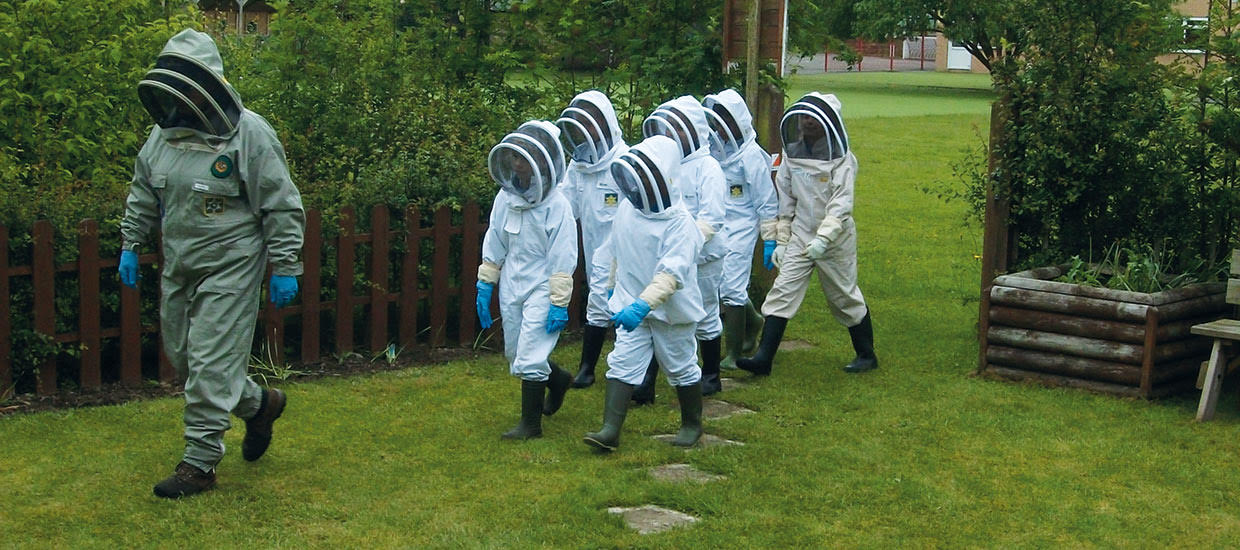Building a buzz around bees
Jane Hughes reports on how one primary school created a honeycomb of partnerships around beekeeping

Twelve years ago, headteacher Dora Plant sent three staff on a beekeeping course. This led to a meeting with beekeeper Yvonne Kilvington, who subsequently began working as an outdoor learning assistant at Ashbrow. The school began to take beekeeping to heart, partnering with a range of organisations to build a wealth of goodwill around what is now a nine-colony apiary.
Today, the pupils, and also their parents and grandparents, share a sense of pride and ownership in the project, which featured on the BBC
As with many groundbreaking school initiatives, the children were inspired by an assembly. Yvonne was keen to educate pupils about the important ecological role bees play in the natural environment – and her talk captivated the children. Keen to capitalise on their enthusiasm, Yvonne worked with Dora Plant to explore how to make bees part of Ashbrow’s Cornerstones Curriculum and Forest School status.
Yvonne was able to establish the first hive with donations of £250 from the school fund and £200 from the Huddersfield Beekeeping Association. Local beekeepers were also keen to help young people learn more about bees, and donated gloves, suits and hives, while two beekeeping equipment suppliers, Thorne and Sheriff, gave discounts on kit.
In July 2019, the school held its first
Ashbrow has a two-form entry, and there are now enough hives for KS1 and KS2 classes to look after one each. Pupils spend one afternoon per week on the project. In the winter, they learn about natural history, microscopy, selection, breeding and honey harvesting. They also learn how to make candles, lip balm, soaps and hand cream, and how to use all the products from the hive.
In the spring, the children don protective suits to enter the apiary and inspect the bees. They check that the queen is laying her eggs, that the colony is healthy and happy and increasing in numbers so that they are ready for the summer. With the help of a local master beekeeper, they
The project has empowered children and their families, says Yvonne.
As word of the Ashbrow apiary has spread, Yvonne has become involved with an important new funding initiative that has enabled five schools and one college campus in South Yorkshire to set up apiaries of their own. She is head beekeeper at the David and Jane Richards Family Foundation (DJRFF), which was set up by Sheffield-born technology entrepreneur David Richards and his wife, Jane, to provide more than £1million to support practical initiatives in both beekeeping and computer science. David, the founder and CEO of software company WANdisco, is a passionate beekeeper and both he and Jane see beekeeping as a valuable way for children to learn about nature, organisation and production. Their foundation was launched last year and will donate £2,000-£3,000 to individual schools to cover the cost of equipment, school membership of the BBKA, and the purchase of bees. Their aim is that the apiaries will be a valuable teaching resource to enrich the curriculum and help children learn about the living world around them.
For more information
- David and Jane Richards Family Foundation: Visit djrff.org to request an information pack and to find out more about the grant application process.
- British Beekeepers Association Bees in the Curriculum is an online resource that provides primary school teachers with everything they need to teach children about bees and get them outside looking at minibeasts and the world around them. It
’s open to all school members and all full members of the BBKA. To join, contact your local branch or association via bbka.org.uk or scottishbeekeepers.org.uk
More on community partnerships
